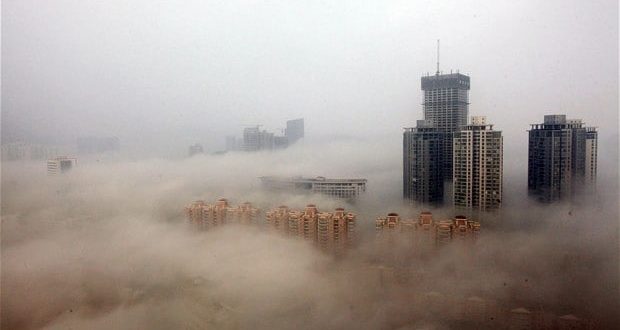China has become a world leader in the fight against global warming, but its severe winter air pollution has worsened—likely as a result of changing atmospheric circulation caused by climate change, according to a new study published in the journal Science Advances.
The research published in the U.S. journal Science Advances suggests that melting Arctic sea ice and increasing Eurasian snow, both caused by global climate change, have shifted China’s winter monsoon, helping create stagnant atmospheric conditions that trap pollution over the country’s major population and industrial centers.
“Emissions in China have been decreasing over the last four years, but the severe winter haze is not getting better,” said Yuhang Wang, a professor at the Georgia Institute of Technology, who led the study.
“Mostly, that’s because of a very rapid change in the high polar regions where sea ice is decreasing and snowfall is increasing. This perturbation keeps cold air from getting into the eastern parts of China where it would flush out the air pollution.”
The findings were based on an analysis of one of the worst air pollution events ever recorded in China, which engulfed the East China Plain in January 2013.
The haze prompted the Chinese government to institute strict targets for reducing emissions from industry and other sources. Despite these measures, haze continues in China during the winter season.
Modeling and data analysis done by Wang and his colleagues found correlations of stagnant air conditions over China to Arctic sea ice, which reached a record low in the fall of 2012, and snowfall in the upper latitudes of Siberia, which reached a record high earlier in the winter.
The results are consistent with observations that South Korea and Japan were unusually cold that winter, while East China was unusually warm, both suggesting that the cold center had moved, he said.
“The very rapid change in polar warming is really having a large impact on China,” Wang said. “Our research shows that cutting greenhouse gases would help with the winter haze problem.”
He Kebin, a Tsinghua University professor, who was not involved in the study, said the results of this paper may help explain in some way why average wind speeds in the North China Plain have been decreasing in recent decades.
But he noted that weather is only an external cause of air pollution and that long-term meteorological conditions that tend to be unfavorable may mean bigger cuts of pollutant emissions are needed for China to achieve its air quality improvement target.
Zhang Renyi, a professor at Texas A&M University, however, slammed this as a “weak” paper and said there are “several fundamental flaws” in their work, mostly noticeable in dealing with the cause-effect relationship.
“They did not prove that A (Artic sea ice) and B (severe haze in China) are even connected, other than for the simple fact of their co-occurrence,” Zhang said.
Agencies/Canadajournal
 Canada Journal – News of the World Articles and videos to bring you the biggest Canadian news stories from across the country every day
Canada Journal – News of the World Articles and videos to bring you the biggest Canadian news stories from across the country every day




Hey the chinese are choking on their own air pollution and they want to become the new world leader in the fight against global warming …. really……just brilliant ….. don’t you think soooo.. James hahahahahahaha
“China has become a world leader in the fight against global warming”. That’s when I stopped reading this fake news story. What total baloney.